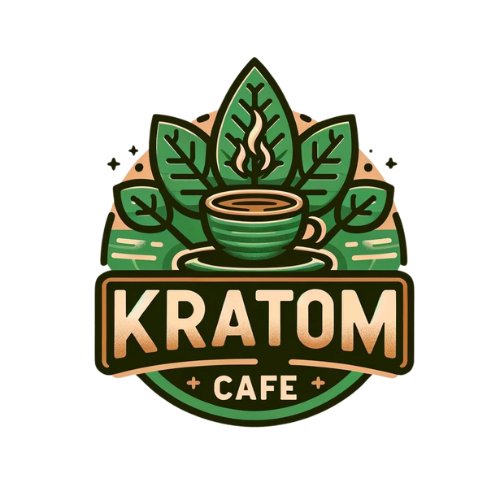Natural painkillers are gaining popularity as effective and safer alternatives to synthetic drugs.
We at Kratom Cafe are pleased to share insights on some of the most popular options, such as turmeric, ginger, and willow bark.
Understanding their proper dosage and being aware of potential side effects is key to using them effectively.
In our blog post, you’ll find practical advice and important guidelines to help you make informed decisions.
How Effective Are Popular Natural Painkillers?
When it comes to natural painkillers, some like turmeric, ginger, and willow bark stand out for their effectiveness and safety profile.
Turmeric Benefits and Usage
Turmeric is renowned for its antioxidant and anti-inflammatory properties, thanks to its active compound, curcumin. Studies have shown that it can reduce pain levels comparable to some over-the-counter medications. For example, a study in 2014 found that curcumin supplementation was as effective as ibuprofen in treating knee osteoarthritis pain. For practical use, opt for turmeric supplements standardized to 95% curcuminoids for optimal effects. Typical dosages range from 500 to 2,000 mg per day. Always take turmeric with black pepper or fats to enhance its absorption.
Ginger for Pain and Inflammation
Ginger has been used for centuries to treat various ailments, particularly for its anti-inflammatory effects. Research suggests that ginger can be as effective as NSAIDs in managing pain, particularly in conditions like osteoarthritis. For instance, a study from the University of Miami found that ginger extract reduced osteoarthritis symptoms significantly more than a placebo. Practical tips include consuming fresh ginger, ginger powder, or supplements, with recommended doses generally around 1-2 grams daily. It’s ideal to incorporate ginger into your meals or take it in supplement form for more concentrated benefits.
Willow Bark as a Traditional Remedy
Willow bark, often considered nature’s aspirin, has a long history of use for pain relief. Containing salicin, which the body converts into salicylic acid, willow bark can effectively manage pain and inflammation. Research, including a study published in the American Journal of Medicine, indicates that it can be particularly useful in treating lower back pain and osteoarthritis. For effective usage, standardized willow bark supplements typically provide 60-120 mg of salicin per day. Be cautious about potential stomach issues similar to what aspirin might cause, and avoid if you have aspirin sensitivity.
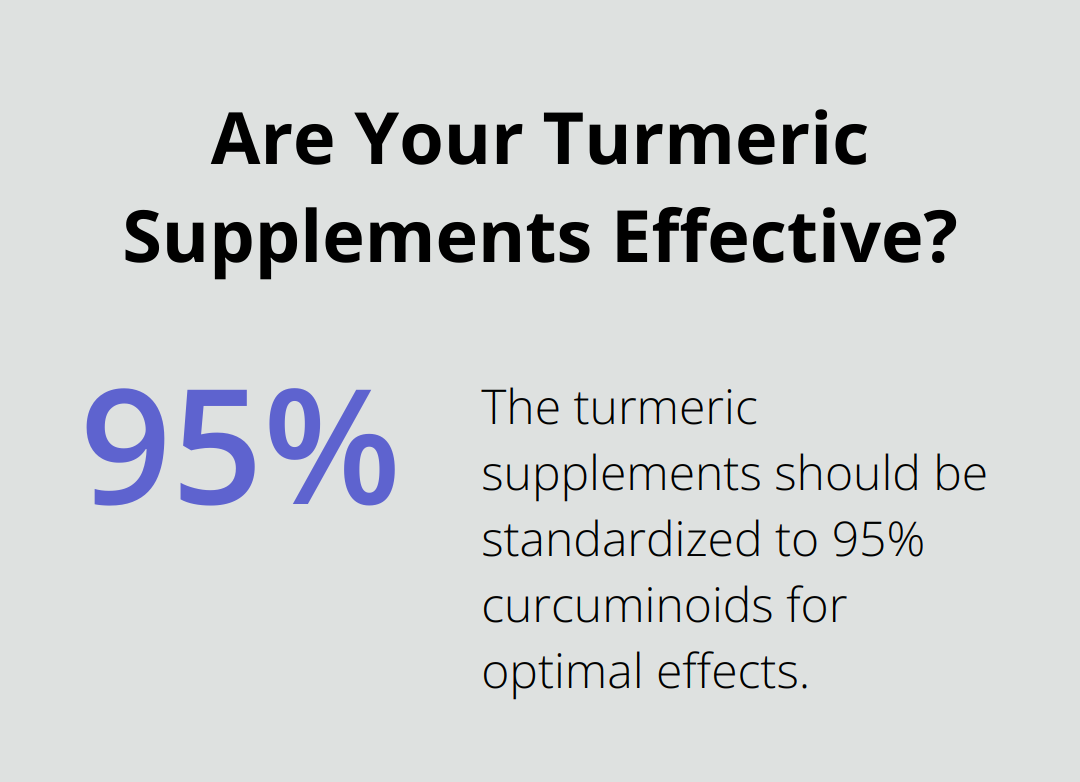
Using these natural painkillers not only provides relief but also offers a safer alternative to synthetic drugs. For more detailed insights on using turmeric, check our guide on turmeric.
Proper Dosage and Application
Recommended Amounts and Frequency for Turmeric
For those looking to incorporate turmeric for pain relief, the dosage and method of intake play a critical role. Turmeric supplements should ideally be standardized to 95% curcuminoids. The most effective range for daily dosage lies between 500 to 2,000 mg. To maximize absorption, take turmeric with black pepper or a source of fat, such as coconut oil or olive oil. This enhances the bioavailability of curcumin by up to 2000%, ensuring you get the most out of each dose.
Safe Uses and Doses for Ginger
Ginger offers potent anti-inflammatory benefits, but getting the dosage right helps to ensure safety and effectiveness. Recommended daily doses for ginger range from 1 to 2 grams. Fresh ginger can be added to meals, while ginger powder can be mixed into smoothies or teas. For a more concentrated dose, ginger supplements are available. These are typically standardized to contain a higher concentration of gingerol, the active compound. Consistent daily intake is beneficial for managing conditions like osteoarthritis.
Effective Ways to Use Willow Bark
Willow bark serves as a robust natural painkiller, similar in function to aspirin. When used correctly, willow bark supplements containing 60 to 120 mg of salicin per day can effectively manage pain and inflammation. This makes it particularly useful for chronic conditions such as lower back pain and osteoarthritis. However, be cautious of potential gastrointestinal side effects, similar to those of aspirin. It is best to avoid willow bark if you have any sensitivity to aspirin or if you’re on blood thinners. Always start with the lower end of the dosage range and monitor your body’s response.
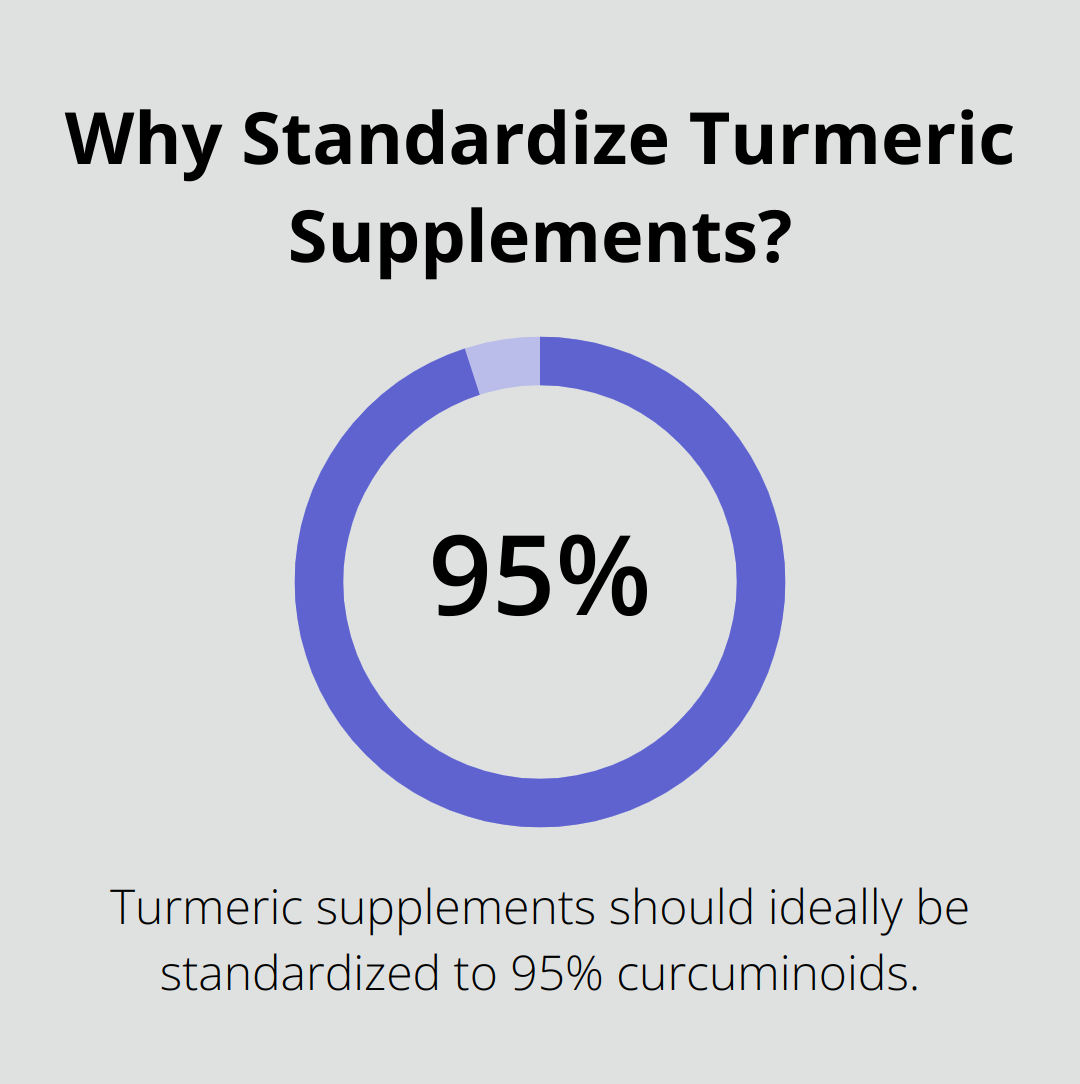
For more specialized insights, such as using turmeric for its antioxidant properties, take a look at turmeric practices.
Are There Risks and Precautions?
Using natural painkillers can offer significant benefits, but it’s essential to be aware of possible risks.
Allergic Reactions and Sensitivities
Allergic reactions to natural painkillers like turmeric, ginger, and willow bark can occur, though they aren’t common. Symptoms can include skin rashes, digestive issues, or even difficulty breathing in severe cases. Turmeric, for example, may cause skin irritation or stomach upset in some individuals. Always start with a small dose to monitor your body’s response. If you experience any adverse effects, discontinue use immediately and consult a healthcare professional.
Potential Interactions with Medications
Natural painkillers can interact with medications, sometimes leading to severe consequences. For instance, ginger can enhance the effects of blood thinners, increasing the risk of bleeding. Willow bark, containing salicin, may interfere with anticoagulants, intensifying their effects. Turmeric, too, can affect drug metabolism in the liver, potentially altering the effectiveness of medications. Always consult a healthcare provider before combining natural supplements with prescription medications to avoid harmful interactions.
Special Guidelines for Pregnant and Nursing Women
Pregnant and nursing women should exercise extra caution. Turmeric in high doses may stimulate uterine contractions, posing risks during pregnancy. Similarly, willow bark is not recommended due to its salicin content, which can affect fetal development and breastfeeding infants. Ginger is considered safer in moderate amounts for managing morning sickness but should be used under medical supervision. Always seek the advice of a healthcare provider before taking any supplements during pregnancy or breastfeeding.
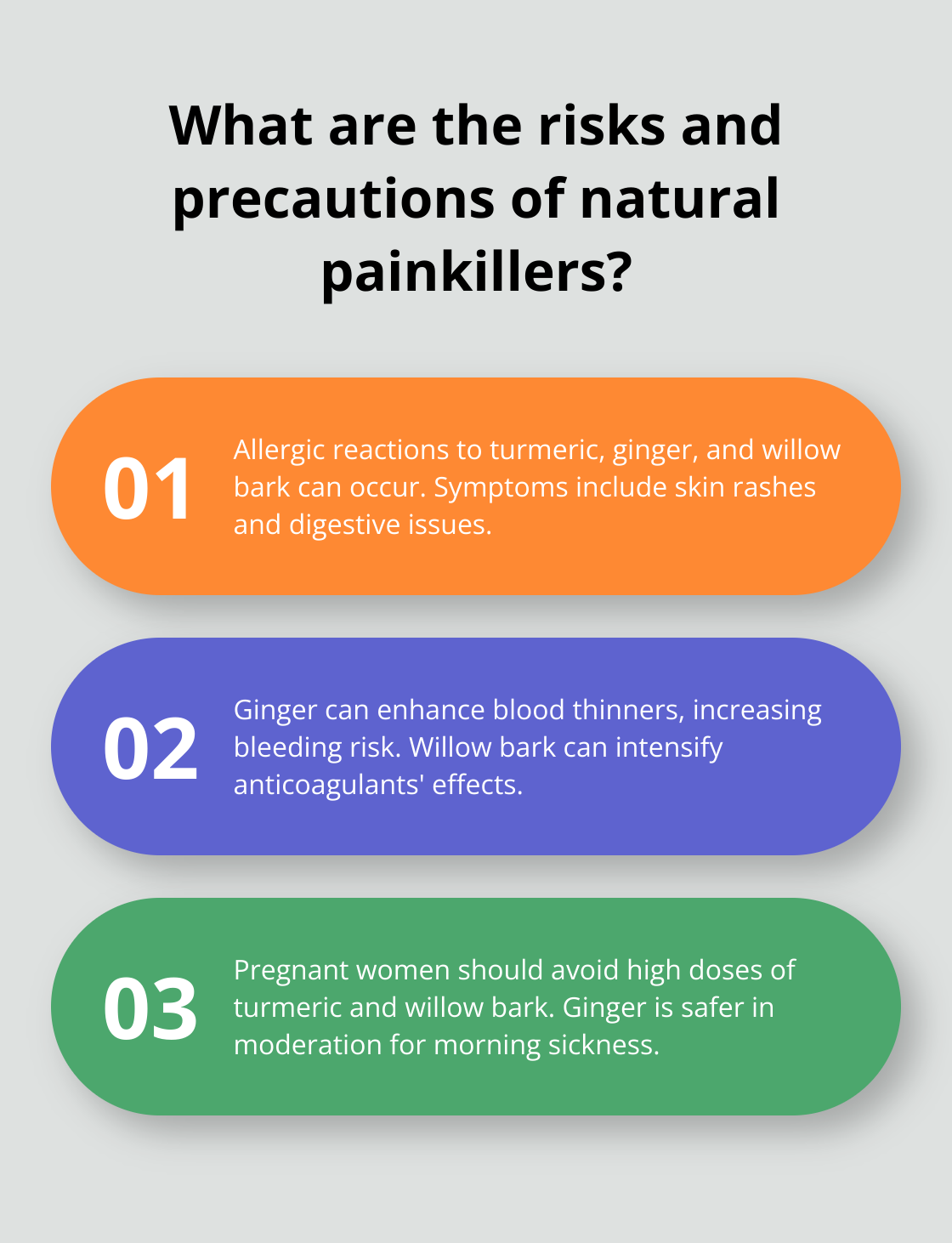
For more on the use of herbal remedies and their safety, see what to consider when choosing various options.
Conclusion
Using natural painkillers like turmeric, ginger, and willow bark can be an effective and safer option for managing pain. These remedies have shown promising results in studies, providing pain relief that is sometimes comparable to conventional medications. However, the key to their effectiveness lies in proper dosage and application. For example, consuming turmeric with black pepper or fats enhances its absorption, and staying within the recommended dose range ensures safer use.
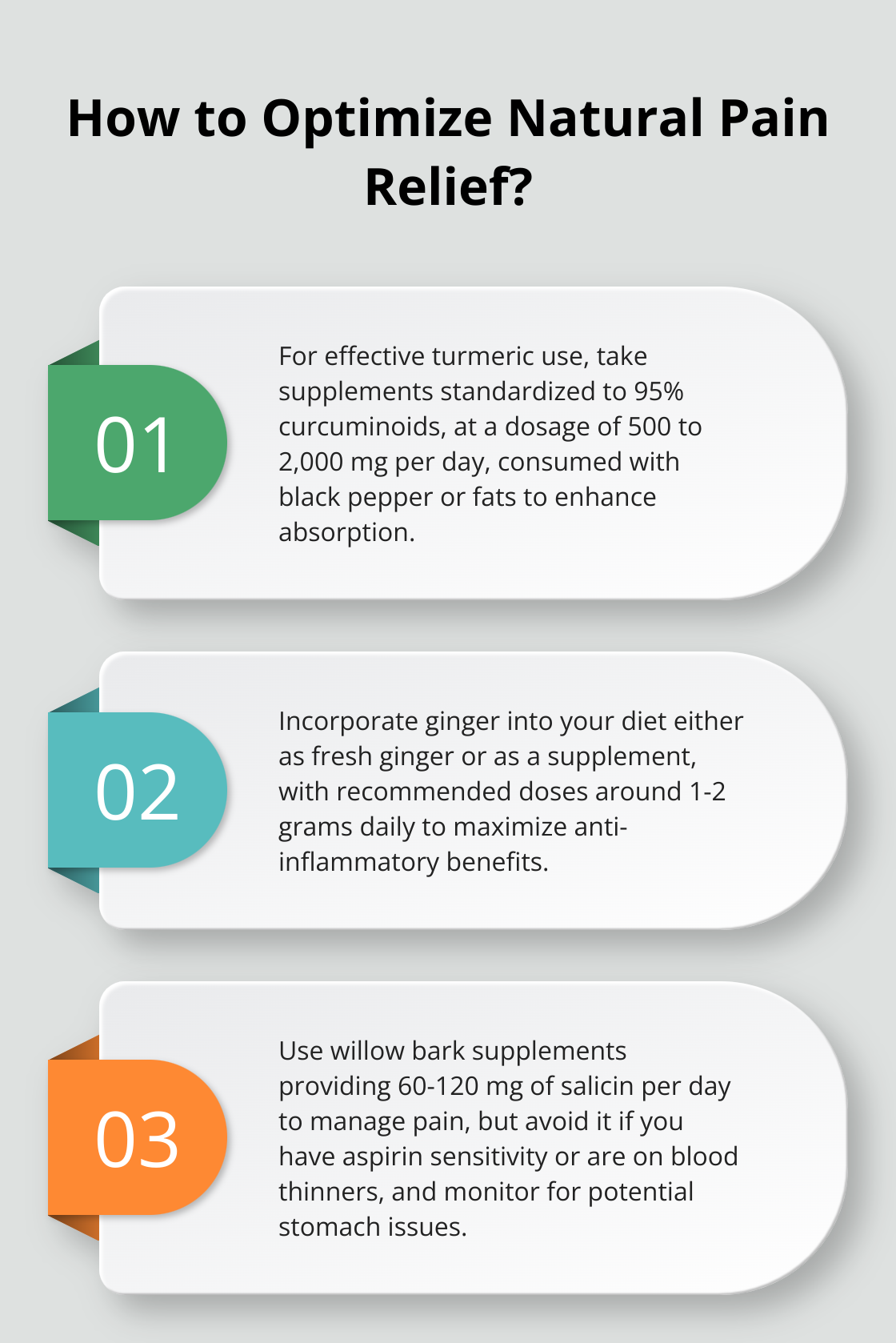
Understanding potential risks and precautions is equally important. Allergic reactions, though rare, can occur. Interactions with medications are another serious consideration, as natural supplements can amplify or weaken the effects of prescription drugs. Extra caution should be exercised by pregnant and nursing women, as some natural painkillers are not recommended during pregnancy or breastfeeding.
We at Kratom Cafe are committed to bringing you reliable and comprehensive information about natural remedies. For those interested in exploring more, check out our detailed guides such as pain management best practices and herbal solutions for pain.
Kratom Cafe is your go-to source for all things related to Kratom and other herbal remedies. Whether you’re seeking the latest research, expert opinions, or user experiences, our platform offers a wide range of resources to help you make informed decisions. Visit Kratom Cafe to explore more about Kratom and other natural painkillers.
